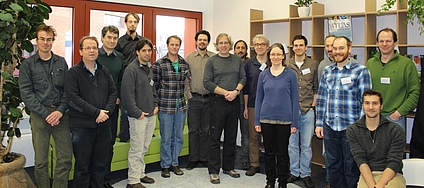sCoMuCra - Species communities harboring the outcome of plant diversification: museums and cradles
First meeting: 06.-11.01.2014
Working group postdoc:
Benjamin Yguel
Project summary.
Preserving biodiversity needs to go beyond conserving species numbers and needs to ensure preserving of the tree of life with all its branches and their specific functional traits. The tree of life is ultimately harbored in local, ephemeral communities. A given community may function as museum – harboring a heritage of ancient evolutionary diversifications –, cradle – harboring recent diversifications –, both or neither of both. A community may be museum or cradle of phylogenetic diversification into lineages, but it may also be museum or cradle of functional diversification of traits within lineages. We have little understanding on (i) how to identify museum or cradle communities, (ii) whether they occur in particular types of habitats, (iii) whether they respond differently to human impact, and (iv) whether museums or cradles are particularly endangered.
Here we will identify museum and cradle communities. We will account for the evolutionary distribution of species across ancient and recent phylogenetic lineages using large-scale databases on plant coexistence and dated phylogenetic trees. We will independently account for the evolutionary basal or derived distribution of trait states (or species interactions) within lineages, using recent databases on plant traits and on the antagonists and mutualists of plants. Our team is trans-Atlantic and will contribute highly interdisciplinary expertise and data. A core of our work is knowledge dissemination and training by intuitive expert-knowledge systems, downloadable lectures, software-packages, and conference-sessions. Moreover, we will develop suggestions for the conservation of both past and more recent biological diversification.
Participants:
Igor Bartish (Academy of Sciences of the Czech Republic); Martin Braendle (Philipps University Marburg); Matthew Helmus (University of Chicago); Joaquin Hortal (Museo Nacional de Ciencias Naturales (CSIC)); Hervé Jactel (INRA); Ingolf Kühn (Helmholtz-Zentrum für Umweltforschung – UFZ); Daniel Moen (Center for Applied Mathematics - École Polytechnique); Wim Ozinga Alterra (WUR / Radboud University Nijmegen); Sandrine Pavoine (Museum National D'Histoire Naturelle); Ian Pearse (Illinois Natural History Survey); Andreas Prinzing (Université de Rennes 1); Oliver Purschke (iDiv); Cyrille Violle (Centre d'Ecologie Fonctionnelle & Evolutive); Evan Weiher (iDiv); Marten Winter (iDiv); Benjamin Yguel (iDiv)
Publications:
Yguel, Benjamin et al. (2016) The Evolutionary Legacy of Diversification Predicts Ecosystem Function. The American Naturalist. see here
Prinzing, A., Pavoine, S., Jactel, H., Hortal, J., Hennekens, S.M., Ozinga, W.A., Bartish, I.V., Helmus, M.R., Kühn, I., Moen, D.S., Weiher, E., Brändle, M., Winter, M., Violle, C., Venail, P., Purschke, O. and Yguel, B. (2021) Disturbed habitats locally reduce the signal of deep evolutionary history in functional traits of plants. New Phytol. See here

